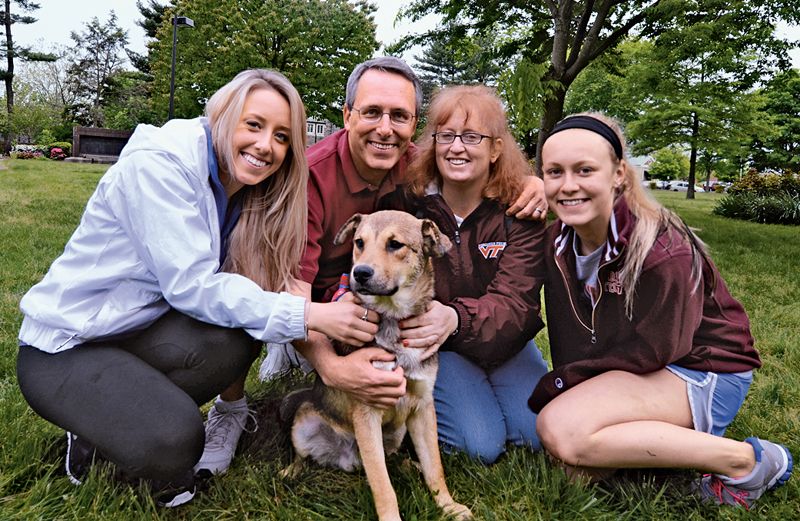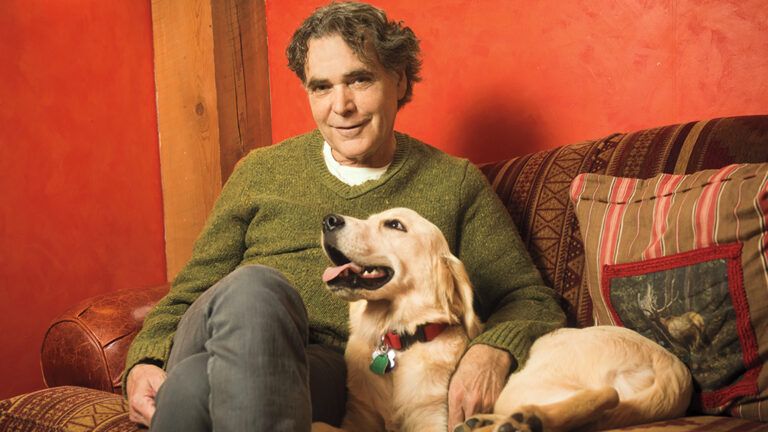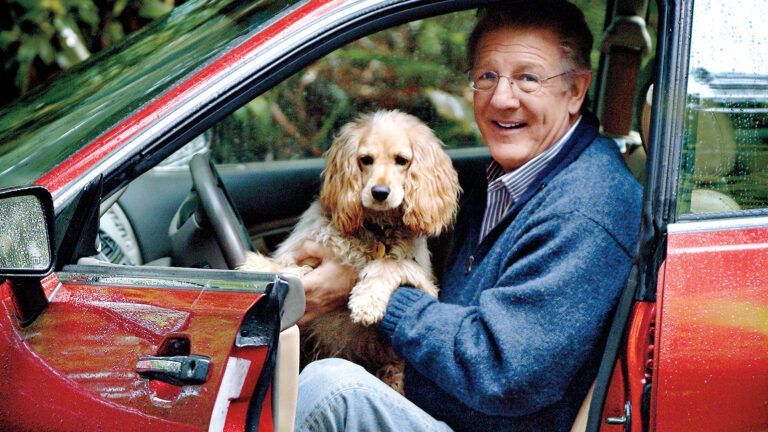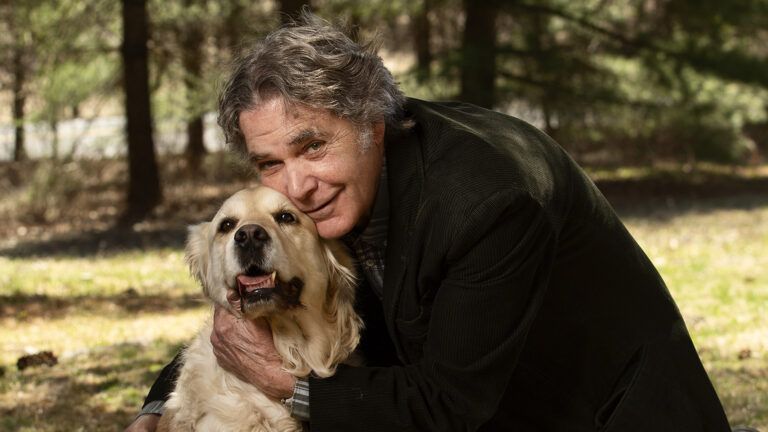It’s been hard since the girls left for college. Sometimes I find myself lingering at work. I’m vice president of a fine-arts printing company. Eventually, though, I head home. I pull into the driveway.
That’s when I see him. Our dog, Cubby, standing on top of an armchair—he’s obviously jumped up there from the couch—watching out the window for me. Yet when I open the front door, he’s sitting on the couch, tail wagging, as if he’s been there the whole time.
He bounds from the couch, landing at my feet. Then he jumps up and tries to give me a kiss. I bend down and let him.
You were right, Alice, I think. The house would feel so lonely and sad without him. I wonder if Cubby misses her as much as I do. He couldn’t miss her more. Then again…
Alice and the girls dragged me to that dog adoption day in May 2013. Yes, I drove us there, but only because I was outnumbered. That’s what happens when you live with three strong-willed women and they join forces. Not fair.
At lunch Ella, 19, and Caitlin, 17, had escalated their campaign to get a new dog, telling me Home for Good Dog Rescue was holding an event at a park nearby. I’d reminded them why it wasn’t the right time for us (our first dog had died the previous year).
“Your mom’s gone twelve hours a day for work,” I said. Alice was on the road a lot training hospital staff in using medical software. “As soon as summer’s over, Cait, you’ll be wrapped up in your senior year. And Ella, you’ll be back at college. I’ll be the one stuck taking care of the dog.”
“Can’t we just go look?” they pleaded.
I turned to Alice for backup, but she had the same question in her eyes. How could I say no when she looked at me like that? I’d never been able to, not since we started dating in college.
At the adoption event, the girls made a beeline for the puppies. I stayed put by the first cage. That was as far as I was willing to go. I saw our girls playing with a pint-sized border collie. I glanced at Alice and shook my head. Too young. Too much work.
Then my gaze fell on the dog sleeping in the first cage. He was good-sized but not quite full grown. He lifted his head and looked back at me.
Something about the soulful expression in those brown eyes got to me. “Can we see him?” I asked a volunteer, not sure what had come over me.
“Sure,” she said. “We think he’s a shepherd-Shar-Pei mix, about ten months old, already housebroken. He came from a shelter down South and is being fostered here in town.”
Alice waved the girls over. We sat on the grass. The dog clambered into our laps, giving us kisses. He even flopped contentedly onto his back for belly rubs. “What a sweet boy,” Alice said. “You know, George, the house feels lonely and sad without a dog.”
What I knew was, we wouldn’t be going home without this dog!
Right away our new puppy made it clear he was family. Whatever we were doing, he wanted to be part of—eating, laundry, watching TV, sleeping. He followed us around the house.
“He reminds me of my best friend when I was growing up, Laura,” Alice said. “She was always trailing the rest of her family, so they called her Caboose. Cubby, for short.” Cubby it was.
Cubby was so affectionate with everyone. No sign that he’d been abused, which is sadly common with rescues. “He must have been a really good dog to someone,” I said to Alice one day.
In August we drove Ella to Virginia Tech for her junior year. The one she had the hardest time parting with was Cubby.
The trip was rough on Alice too, not as much emotionally as physically. She was having an abnormally heavy period. She chalked it up to pre-menopause (she was about to turn 50).
Two weeks later, the bleeding hadn’t stopped, and Alice had terrible pelvic pain. I took her to the hospital. The diagnosis was devastating: uterine carcinosarcoma, a rare cancer, highly aggressive. It had already spread from her uterus to her abdomen and lung.
Alice took the news far better than I did. Part of it was her personality—spirited and direct. Part of it was her family history. Several close relatives had succumbed to cancer, including her mother, who died of lymphoma at 40.
Part of it was her profession—she’d trained oncology teams on software. Specialists discussed her options with us. The terminology was over my head. Stage 4B. Distant metastasis. Palliative care. But Alice understood.
“So chemotherapy could cure this?” I asked, confused.
Alice took my hand and said calmly, cutting to the chase like always, “No. I don’t have long. I am going to die.”
Still, she wanted to try chemotherapy in the hopes that it might give her one last Christmas with us. Three weeks after her first round, complications with her lungs left her too weak to go upstairs. We set her up with her oxygen tank on the couch in the family room.
Cubby knew. He stopped following us around. He only wanted to be with Alice. He parked himself by the couch, right where she could reach him.
I often saw Alice dangling her hand, stroking his head weakly. “Love you, Cubby Bear,” she’d whisper. I worked from home in another room. One day Cubby kept pacing between the rooms. I finally followed him.
Alice was watching a movie about a mom dying of cancer. She was crying uncontrollably. Cubby looked at me as if to say, I couldn’t take care of her this time. Can you?
I turned the movie off and sat next to my wife. “I don’t want to die,” she said.
“I know,” I murmured, feeling as helpless as Cubby must have. All I could do was hold Alice until she fell asleep.
That first round of chemo turned out to be her last. Alice died in the hospital just six weeks after her diagnosis. Ella, Cait and I were with her.
She wasn’t lucid enough to know Cubby wasn’t there; she thought he was, and I believe that brought her a comfort that even the girls and I could not.
In lieu of flowers we asked that donations be made to Home for Good Dog Rescue. A month later, I got a call from HFGDR’s founder. She said thousands of dollars had poured in, all donations in memory of Alice.
“That’s what she would have wanted,” I said. I told the woman how Cubby never left Alice’s side during her illness. “We feel so fortunate to have adopted a dog with a heart like his. He obviously came from a loving family.”
“Loving family?” She paused. “Cubby was one day away from being euthanized when we picked him up. He was severely malnourished. He didn’t trust anyone and cowered whenever we approached. It took his foster family weeks to get him well enough for adoption.”
I looked at Cubby, lying at my feet. I knew it was no accident he’d been given a second chance. He was meant to join our family, to love and comfort my wife in a way only he could.
And not only Alice.
With the girls away at school, it’s just Cubby and me. At night, when I’m ready to turn in, he bolts upstairs ahead of me and jumps on Alice’s side of the bed.
Once I’m settled in bed, he’ll lie with his paw touching me or his head on Alice’s pillow. He stays there until I fall asleep, and he’s back on the bed again when I wake up in the morning, those soulful brown eyes looking into mine.
I feel like he’s telling me, I know you get sad and lonely without Alice. I miss her too. But we have each other. That’s what she wanted.
The dog I didn’t want is the dog I can’t imagine living without.






